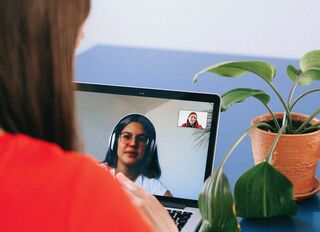Online Therapy
What Does My Therapist Really Think of Zoom Sessions?
Four therapists discuss their experiences of working remotely.
Posted November 7, 2020 Reviewed by Ekua Hagan

Online therapy used to be the overshadowed little sibling of face-to-face counseling. Yes, it was possible, if you lived somewhere remote or had an access issue, and of course, there have been therapists offering telephone and video appointments to business people and others with a tight schedule for years. On the whole, though, it has been largely seen as a ‘second-best’ solution, with actual in-person work being held as the "gold standard," and digital work being somewhat looked down upon, both by therapists and clients.
The COVID-19 pandemic has meant that many therapists have had to rapidly change their position on this, either adapting to working online willingly, or simply because for much of this year, there has not been a workable alternative. I’ve heard clients both praise remote counseling for its convenience, as well as the opportunity it offers to do therapy from the comfort and safety of one’s own home. I’ve also heard clients slam it for being impersonal and stressful. Privacy concerns, particularly for those living in shared accommodation, or with someone they don’t feel safe around, are often raised. But what do therapists themselves think of working in this way? Here, four therapists offer their experience of working remotely.
Lauren McMeikan LMFT, licensed marriage and family therapist, Los Angeles:
“To its credit, teletherapy makes treatment more accessible. Specialists often reside in cities, making local, evidence-based treatment scarce in some areas. While therapist’s licenses [in the USA] still limit where they can practice, teletherapy expands the pool of potential providers. Hopping online is also easier than commuting to appointments. This convenience makes therapy more feasible for those with busy schedules. Parents can do sessions during naps and employees can have sessions on breaks.
"That said, technological glitches make teletherapy frustrating. Sometimes video lags or audio drops during vulnerable moments. Technical difficulties aside, Zoom birthdays, video conferences, remote learning and, yes, teletherapy, feel different to their in-person equivalents. While it’s wonderful that technology allows for continued treatment, there is some humanity lost meeting online. As for outcomes, research shows teletherapy and in-person therapy are equally effective. I have likewise found that online and in-person client’s recovery happens at a similar rate and pace.”
Dr. Gabrielle Avery-Peck, licensed psychologist, Florida:
“I have been seeing clients exclusively online since March. It was tough at first, and a little awkward. I have found, though, that once everyone adjusts to the oddness of it … it seems to be as effective as in-person therapy (or at least no one has asked to return to in-person as a result!). I definitely understand the issues relating to privacy, and that is the top concern that pops up when I speak with potential new clients. But as someone who treats OCD and anxiety-related disorders almost exclusively, it has had significant, positive effects on treatment due to the ability to complete in-vivo exposures in the client’s home. When treating OCD, for example, clients often have a number of observable compulsions that they complete in the privacy of their own homes. In-vivo exposure is directly facing the feared object or situation in real life … and what is more real than facing the situation where it regularly appears!
"I have completed entire sessions with clients from their bathroom (and me in my bathroom) where we go back and forth touching feared objects and tolerating the “dirty,” “gross,” or “contaminated” feeling that manifests. In these cases, telehealth is a benefit to the client-it gives them access to support where they need it the most.”
Nadine Heerhold, Integrative Counsellor, London:
“When the first lockdown started I was still a trainee, and with less than 24 hours notice I had to move to either phone or video counseling with no prior training or experience. Due to my living situation (shared accommodation, unreliable WiFi), I opted for telephone counseling. Fortunately, I had only been assigned clients who preferred telephone appointments too, but it was still a struggle at the beginning, not knowing how to work in this way and what to look for, especially having to adapt to the new way of living as well.
"I do still prefer face-to-face meetings, but I have realised that a lot of clients, and sometimes even myself, feel more comfortable on the phone. So many things have been moved to Zoom and Microsoft Teams etc., and not having a camera focused on you all the time has been a nice break (Zoom fatigue is a real thing!). It also gives a feeling of being in a confessional box and I have noticed that my clients have been able to 'open up' much quicker. Phone appointments have also been more accessible for clients who are not as 'tech-savvy’ and otherwise do not have the opportunity to receive counseling. Overall, I cannot wait to go back to face-to-face sessions, but for now, I am glad that I can still give my clients what they need, even if it’s not in the 'traditional' way.”
Brian Ching, assistant psychologist, paediatric hospital in London:
“I have found having appointments with children and young people and their families over the telephone and/or Zoom quite rewarding. Despite not being able to be in the same room as families like prior to the pandemic, I’ve still been able to develop meaningful relationships with the families I see and I definitely think rapport can still be built over the phone. I do think it’s nice to be able to put a face to the patients you’re seeing but Zoom allows that. On the other hand, it can come with its difficulties like dealing with technical issues, such as poor internet connection and not being Zoom-literate. The latter can be easily solved by a simple instruction manual I send to families before their appointments though!
"Most importantly, I believe virtual appointments ensures families can still access the psychological support that is needed during COVID-19. This is my experience though, and it’s interesting to hear how my colleagues are finding remote clinical work. Some have found it more of a challenge to engage young people over telephone but others have found it really easy. Some think telephone appointments are more accessible but others disagree. It’s all so diverse and everyone’s experiences are so personal to each and equally valid."
The therapists who were kind enough to offer me their opinions seemed to express some of the sentiments that clients themselves experience—remote therapy may feel awkward, uncomfortable, and disconnected. At the same time, it certainly has its place, and has enabled large numbers of people to continue vital work during an unprecedented time. As an inspirational quote on a coffee cup (which I can’t for the life of me find the original author of) said, a done something may indeed be better than an imperfect nothing. That said, clients may have valid reasons for not wanting or being able to work in this way, that should always be respected and taken into account. For more discussion of why clients might choose not to work online, you can see an earlier post of mine, called "Dear Therapist: Why I Don’t Want to Zoom."




